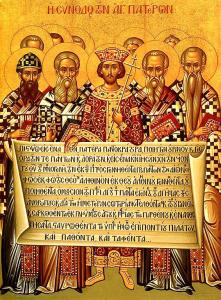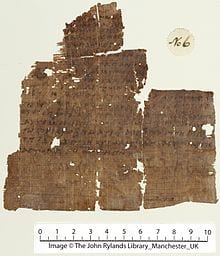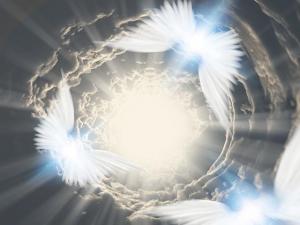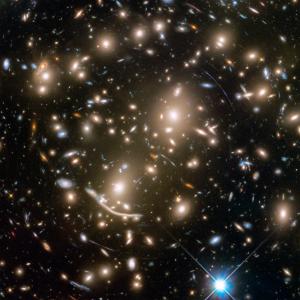
When I say the Creed, make my Profession of Faith at Mass, I’m not reciting a list of things I believe. I am confessing whom I believe in. To believe in someone is to commit oneself to be part of that one’s story. So the Creed isn’t much like an essay on the topic “Things I Believe.” It’s a story and it’s dramatic. Here I tell the story, filling in some details as they strike me. I don’t imagine it improves the traditional Creed or (heaven forbid!) replaces it. I just like the story and tried, in a small way, to own it.
This post introduces series on the first part of the Creed of Christians. The introduction continues after this list of links to other posts in the series.
A Table of Contents
- Introduction and my “story” Creed (below)
- God Pantokrator. What does the Creed say about God’s Power
- The Weakness of God is Stronger than … Strength
- I Believe in the Father
- God as Mother
- Inclusive Language
- One God, Part One: The Worldview behind the Many Gods of Paganism
- What the Jews Gave us: The Story of a World Going Somewhere
The Creed is a telling of the story of salvation history. The first part begins the story with God as creator. I extend this part to include God’s creating and sustaining the Jewish people. In the second part the Creed narrates the story of Jesus and salvation wrought through him. Jesus’ story begins before creation and continues to the Second Coming. I add details to this story. The Holy Spirit, in the third part, brings us, with the Church, into the story and into God’s Trinitarian life. This part, like the second, retells the whole story, from God’s inner life before creation to the renewal of the world at the end of the age.
The embellished Creed (Asterisks are links to a few notes at the end.)
- I believe in God, whom I know as Father and by many other names, *
- who calls into being powers and peoples with all their varied splendors, *
- leading, disciplining them with the power and weakness of love, *
- who in ages past, with particular care, gave birth to the Jews,
- intending one people to be a blessing to all nations,
- then bore them and bore with them through persecution and their own sin,
- as witnessed in the Jewish Scriptures.
- who calls into being powers and peoples with all their varied splendors, *
- I believe in God’s anointed one, Jesus,
- Son of God from all eternity, first heir of the Father’s self-sacrificing love,
- eternally offering back that gift, to the Father’s ever-growing delight, *
- yet formed in time of the flesh of this world in the womb of the virgin Mary,
- born a child of a laborer at carpentry, a Jew, a member of an oppressed tribe,
- even a Galilean, from where, as the saying went, “What good can come?” *
- Obedient, he made his own the concerns of all he met, *
- whether friend or enemy, rich or destitute, high-society or rebel.
- Rejected for proclaiming the Reign of God over all those human concerns,
- tried for blasphemy, calling sinners forgiven and those we reject blessed,
- abandoned by friends, and left alone by God,
- with not a single success to own at the end, only a cross,
- he suffered under Pontius Pilate the Roman punishment for sedition,
- was crucified, died, and was buried.
- In fulfillment of the Scriptures,
- he came to the limit of parting from God
- and unity with us failing sinners, the depths of hell; *
- and God approved him, raising him bodily in the Spirit, the first of many;
- and he ascended, glorified, to his place with the all-loving God.
- he came to the limit of parting from God
- From there he will come again to preside over a renewed creation
- with all who will accept mercy and disown comforting idols
- of pride or hopeless submission to the way things have to be.
- with all who will accept mercy and disown comforting idols
- Son of God from all eternity, first heir of the Father’s self-sacrificing love,
- I believe in the Holy Spirit,
- Life and Fire blowing in the play and passion of Father and Son’s love,
- who does love’s work
- in God’s Trinitarian life,
- in the created world,
- and between world and God,
- who embraces all in unity and blesses each one’s uniqueness;
- who has inspired many scriptures, *
- who gave life to Jesus’ despairing followers,
- who brings people to the Father in their different ways, all in Jesus’ arms.
- In that Spirit I believe
- with the Communion of Saints on earth and in heaven, the Catholic Church, *
- with apostles, martyrs, teachers, and all who encourage by word and deed,
- with the ones who gave me life, Dave, Rose Marie, and all my forebears.
- I believe in the mission Jesus gave us, when he breathed his Spirit upon us,
- to be part of his story, to honor and purify the human concerns we meet
- in the names of the Father and the Son and the Holy Spirit,
- looking forward, past our many failures, to God’s reign in all things.
- to be part of his story, to honor and purify the human concerns we meet
- I believe that God’s Spirit is always doing something new on earth, *
Notes:
- Names from the Bible, including Mother. I know of a calendar that lists a biblical name for God for each day of the year. Add to that the “99 Names of Allah” of the Muslim faith, Plotinus’s “One,” and the many ways, other than “God” that religions name the Ultimate.
- Powers include the powers of the natural and human worlds and the powers of heaven. Karl Rahner thinks these two must be related somehow.
- Through Jesus we learn that God’s weakness is much more effective at changing hearts than any display of power.
- Hans Urs von Balthasar imagines an interplay in Father and Son’s mutual self-sacrificing love, through which each eternally grows in blessedness.
- Nathaniel’s quoting of a common phrase notes God’s self-abasement at the very beginning of Jesus’ ministry in John’s Gospel.
- The notion of human concerns, which Jesus takes over and purifies comes from Franz Jozef van Beeck.
- I’ve borrowed but expressed in my way Balthasar’s idea of the “descent into hell.” It seems to me that Jesus identification with us in the depths of our misery and sin, as well as his resurrection, is how Jesus fulfills the Scriptures.
- Catholic theology has not finished considering whether and how other religions are used by God for the salvation of the human race. I suspect that the Holy Spirit gets involved in these in some way.
- Where the Creed says “I believe in the Church,” some theologians say that “in” has the force of “with” or “on the strength of.”
- When God’s Spirit or a symbol thereof is mentioned in the Old Testament, it always seems to be a time when something radically new is happening. The Spirit also embarks on something new in Jesus’ baptism and at Pentecost.
- “Fate” is the idol that traps us in spiraling cycles of revenge or just ever-repeating cycles. Forgiveness conquers this false god.
- Again Balthasar insists that heaven is not a static happiness but continuing growth.
Image credit: Wikipedia via Google Images












